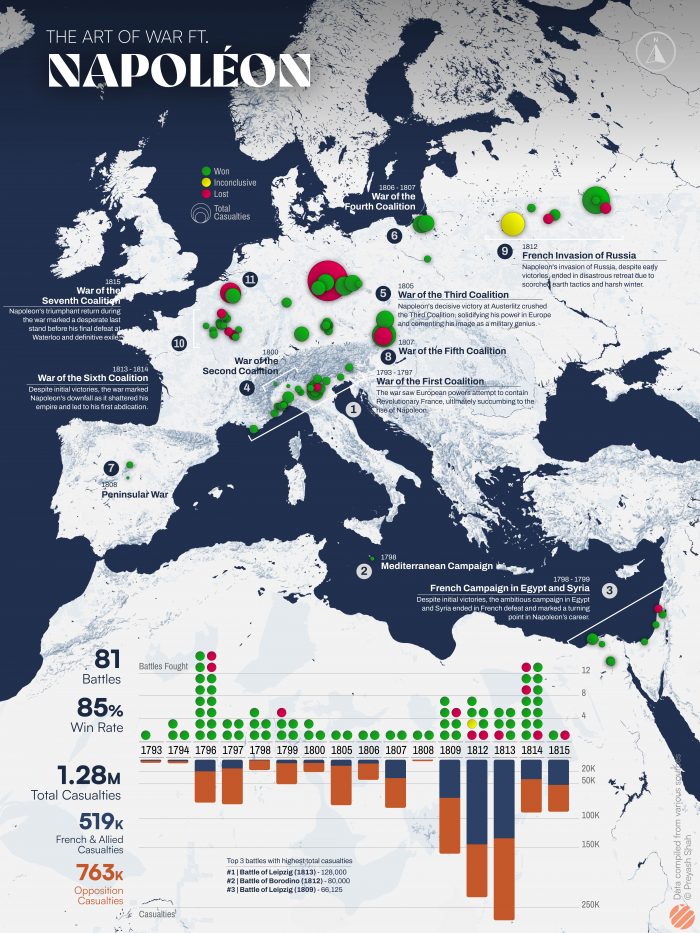
The rise and fall of one of the last great conquerors. Why is Napoleon so well know, and how did Napoleon die?
The Battle of Austerlitz: The “Battle of the Three Emperors”
The Battle of Austerlitz, fought on December 2, 1805, was touted as Napoleon’s greatest victory where he skillfully outmaneuvered the Russian and Austrian armies. A total of about 16,000 casualties were reported, with the Allies suffering significantly more losses than the French. This battle solidified Napoleon’s reputation as an exceptional military strategist and cemented France’s supremacy in Europe.
The Battle of Jena-Auerstedt: The Prussian Stalemate
Fast forward to October 14, 1806, the Battle of Jena-Auerstedt was a double-battle where Napoleon’s forces clashed with the Prussian army. The French emerged victorious with approximately 25,000 casualties while the Prussians suffered a massive loss of about 50,000 men. This battle marked the end of Prussia as a major military power until the latter part of the 19th century.
The Battle of Friedland: A Blow to the Russians
On June 14, 1807, the Battle of Friedland saw Napoleon’s forces pitted against the Russian army. The French won the battle but at a cost of approximately 10,000 men, while the Russians lost nearly 20,000. This significant defeat led to Russia’s withdrawal from the war and the signing of the Treaty of Tilsit.
The Battle of Wagram: The Austrian Stand
Two years later, on July 5-6, 1809, the Battle of Wagram was fought against the Austrian Empire. Despite being one of the bloodiest battles of the Napoleonic Wars with a staggering 78,000 casualties, Napoleon managed to secure a decisive victory. This marked the end of the Fifth Coalition and further enhanced Napoleon’s control over Central Europe.
The Battle of Borodino: The Costly Victory
The Battle of Borodino, fought on September 7, 1812, was the deadliest single day of the Napoleonic Wars. Despite being a French victory, it came with a high price as they suffered approximately 30,000 casualties while the Russians had around 45,000 losses. This Pyrrhic victory was a turning point as it instigated the downfall of Napoleon’s Grand Army and marked the beginning of the end of his reign.
Napoleon’s Downfall and Final Years
Napoleon’s invincibility started to wane post-1812. He faced defeat in the Battle of Leipzig in 1813 and the Battle of Waterloo in 1815, which led to his exile to the island of Saint Helena. There, he lived out his final years, dying on May 5, 1821. Despite his fall from power, Napoleon’s impact on history is undeniable. His military campaigns reshaped Europe, and his Napoleonic Code forms the basis of much of the civil law systems across the world today.
How Did Napoleon Die?
While Napoleon’s death is still somewhat of a mystery, we have a pretty good idea of what happened. An autopsy was conducted in 1821 and it was concluded that he died of stomach cancer after a larger dose of calomel. Calomel is a compound containing mercury that was used as medicine. He died shortly after being administered the “medicine.”
Sources:
1. Roberts, Andrew. “Napoleon: A Life.” Penguin Group, 2014.
2. Chandler, David G. “The Campaigns of Napoleon.” Scribner, 1966.
